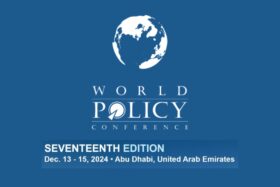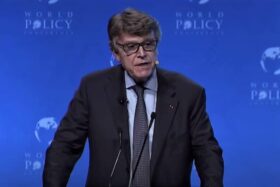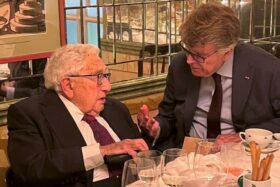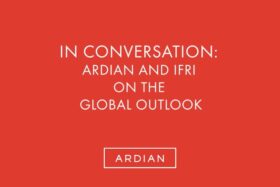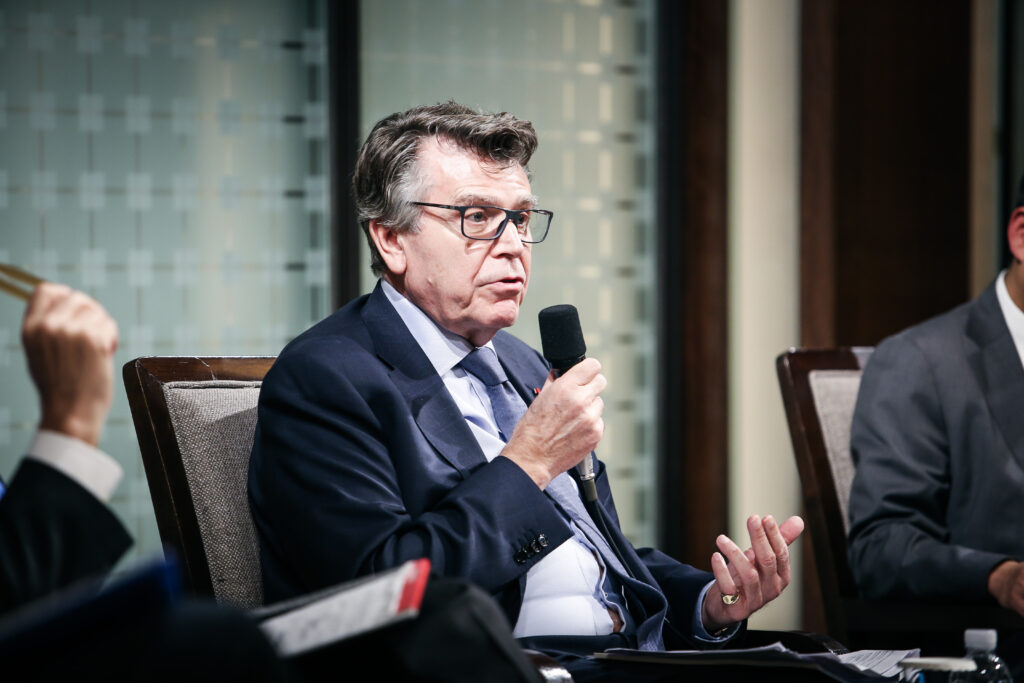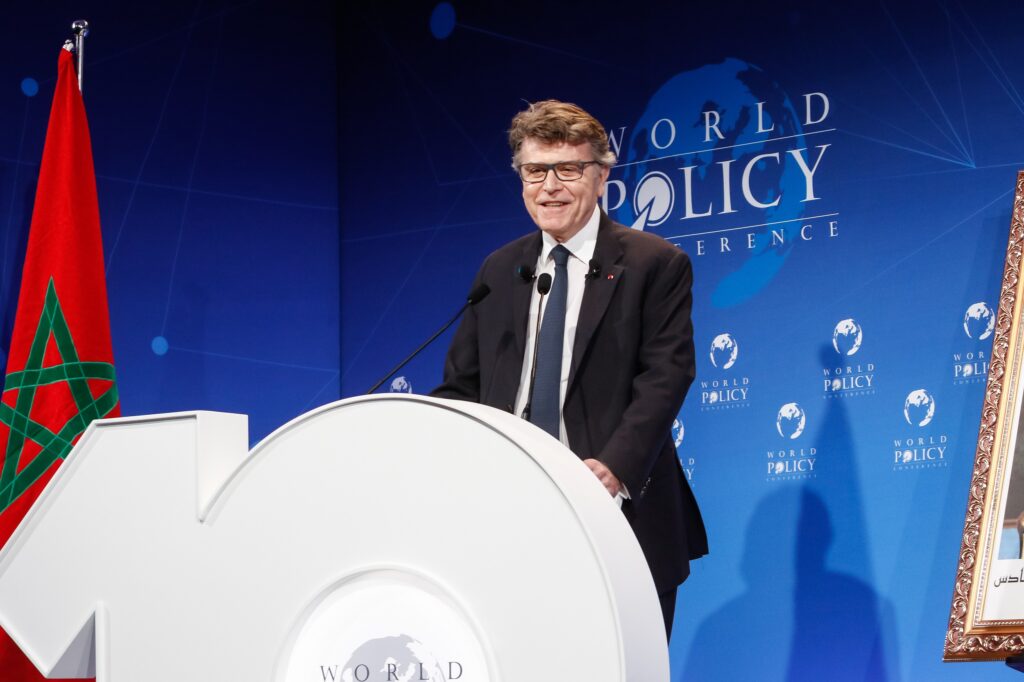École Polytechnique
1963-1965. Student at École Polytechnique, graduating third in his class.
1966-1969. Student at École Nationale Supérieure des Mines de Paris (Corps des Mines).
1967-1968 and 1969. University of California, Berkeley, Department of Economics. Following his PhD under Prof. Gérard Debreu (Nobel Prize, 1983), Thierry de Montbrial chose to pursue an academic career. He returned to École Polytechnique, first as an assistant professor in 1969. He developed courses on mathematical economics, which led to his first book (Theoretical Economics).
1973. Elected “full professor” at École Polytechnique. The election of Thierry de Montbrial was in line with the strategic choice of École Polytechnique to give economics equal weight and importance relative to other major traditional scientific disciplines.
From 1974, he held the chair of Theoretical Economics, training a large portion of France’s elites in economics and later geopolitics and geostrategy.
In 1988, he published La science économique (PUF), which became a reference textbook.
After 1992, he progressively shifted his focus toward geopolitics and geostrategy, domains in which he became a recognized authority.
On 7 May 2009, he delivered his final lecture entitled Geopolitics between war and peace, marking the end of a prestigious academic career spanning over 40 years at École Polytechnique.
Ecole Nationale Supérieure des Mines de Paris. Engineer of the Corps des Mines
1966-1967. “Student engineer” of the “Corps des Mines” and student of Maurice Allais, Nobel Prize in Economics in 1988.
In 1969, he became an assistant professor at École Polytechnique, where he taught mathematical economics. In 1970, he taught at the Faculty of Law and Economics in Nancy.
Ph.D. at the University of California (Berkeley), in mathematical economics
Student at the University of California, Berkeley, pursuing a Ph.D. thesis in mathematical economics under the supervision of Professor Gérard Debreu (Nobel Prize Laureate in 1983). Mathematical economics was then booming in the United States. The field was contemporary to the development of the second generation of American think tanks and leading institutions such as the Rand Corporation and the Cowles Commission.
Second Semester, 1969. Assistant to Professor Debreu in Berkeley. Thierry de Montbrial taught courses such as mathematical programming at the graduate level.
1970. Thierry de Montbrial was awarded a Ph.D. (Doctor of Philosophy in Economics) for his thesis entitled: Intertemporal General Equilibrium and Interest Rates Theory. The aim of this thesis was to address the topic of time (and therefore potentially uncertainty, imperfect information, money and interest, etc.) in the very Platonic theory of economic equilibrium and optimality. This work was part of a broader reflection on time, a reflection which he has never ceased to pursue throughout his life.
Project Leader at the General Planning Commission
While continuing his teaching activities, he was appointed as Project Leader at the General Planning Commission (CGP), the major institution created after the Second World War by Jean Monnet around the original concept of “indicative planning”.
There, Thierry de Montbrial’s work pertained mainly to:
1-the introduction of money and international economics in planning methodology;
2- the degree of relevance of large econometric models and the question of whether it is possible to adequately represent the path between the “short term” and the “medium term”;
3- the concepts of forecasting and forecast error.
1971
Theoretical Economics
puf
The beginning of this book is dedicated to decision theory and game theory; general equilibrium theory is then presented in depth, followed by the concept of temporary equilibrium. The classical theory of interest and temporary equilibrium, and the work of Hicks, are then presented in a unified framework. The final chapter is dedicated to the contributions on uncertainty by Arrow, Debreu, and Radner.
Director of the Centre for Analysis and Forecasting (CAP) of the French Ministry of Foreign Affairs
In 1973, Michel Jobert, Minister of Foreign Affairs under Georges Pompidou, entrusted Thierry de Montbrial with establishing a “Centre for Analysis and Forecasting” (CAP) within his ministry, which has since become the “Center for Analysis, Forecasting and Strategy” (CAPS).
Thierry de Montbrial pioneered what he called “intellectual diplomacy”, which led him to establish close ties in the United States, enabling him to meet some of the most prominent personalities of the time, as well as in Japan and other countries. In recognition of his actions in the 1970s and the following decade, the Emperor of Japan would later award him the Order of the Rising Sun, Gold and Silver Star.
Thierry de Montbrial was particularly interested in the European construction and Franco-German relations, and became an active member of Club Bilderberg and the Trilateral Commission, two institutions from which previously France was essentially absent. He became a member of the Bilderberg Steering Committee from 1976 to 2011. As part of the Trilateral Commission, in 1982, he co-authored with Ambassador Nobuhiko Ushiba and Harvard Professor Graham Allison a study entitled Sharing Global Responsibilities, which in some respects heralded his further work on global governance.
In these years, the CAP’s work focused particularly on energy (the period was marked by the oil shocks of 1973 and 1978), the international economy, détente in Europe as well as on disarmament and the major strategic issues of the time.
Member of the Bilderberg Steering Committee
Founder and Executive Chairman of the French Institute of International Relations (Ifri)
- Drawing on his previous experience and recognition, Thierry de Montbrial founded the French Institute of International Relations (Ifri), France’s first independent think tank.
Ifri quickly established itself as a global reference, recognized by its peers. The institute’s activities aim to enlighten public and private decision-makers facing international dimensions. Ifri ensures it always works in the direction of and for the benefit of the general interest. It also contributes, through its influence in France and abroad, to stimulating and structuring public debate on major global issues.
With nearly half a century of experience that has witnessed the end of the Cold War, the acceleration of the digital revolution, the explosion of political Islamism and international terrorism, the vicissitudes of globalization, China’s rise, the emergence of global problems such as climate change and pandemics, and the Ukraine war, Ifri has acquired the necessary perspective to inscribe its action in the long-term, following the example of the major British and American institutes/think tanks that were born in the aftermath of the First World War and that inspired its creation.
1981
Western Security: What Has Changed? What Should Be Done?
Economica
Report published by Thierry de Montbrial with his American (Winston Lord), German (Karl Kaiser), and British (David Watt) counterparts, published simultaneously in the four countries. While America was concerned about Europeans drawing closer to the USSR and, conversely, certain Europeans, notably in Germany, resisted any questioning of the achievements of détente, the authors of this Report agreed on a reformulation of NATO's missions that remains a source of inspiration today.
1983
The European Community: Decline or Renewal
Economica
Report by Thierry de Montbrial and his German (Karl Kaiser), Italian (Cesare Merlini), British (William Wallace), and Dutch (Edmund Wallenstein) counterparts, published in the five countries.At the beginning of the 1980s, while the Western world was undergoing profound transformation, the European community was being questioned: did its construction make sense? Better supported by growth and prosperity, could this enterprise be a response to the crisis?
Chairman of the Franco-Austrian Centre for Economic Rapprochement in Europe. Honorary Chairman since 2021
The Franco-Austrian Centre for Economic Rapprochement in Europe (CFA/ÖFZ) is a Franco-Austrian intergovernmental organization initiated in 1976 by Prime Minister Jacques Chirac and Federal Chancellor Bruno Kreisky to develop economic relations between Western and Eastern Europe, and to contribute to creating a Europe of peace. The CFA’s association with Ifri began in 1983. Thierry de Montbrial was elected to its chairmanship in 1985. The initial partners to France and Austria were Poland, Hungary and Czechoslovakia, with which Thierry de Montbrial was able to establish fruitful contacts from 1983 onward.
After the fall of the Berlin Wall, the CFA refocused its action on the problems of European Union enlargement and integrated into its field of activity the new member countries in their integration process. From 2004, the CFA also turned toward the European Union’s neighbors, particularly toward the Western Balkans countries, which envision their future in a European perspective.
The CFA promotes dialogue about the future of Europe. Today, it centers its activities around three directions: Franco-Austrian bilateral dialogue, the future of the EU, and the future restructuring of the continent.
Since 2015, the CFA has been chaired by Dominique David, Special Advisor to the Executive Chairman of Ifri.
Since 1981
Co-Director of RAMSES
Economica then Dunod
Published annually since 1981, the RAMSES report is a reference work that offers to a broad public the keys and benchmarks essential for deciphering and following developments on the international scene. RAMSES illuminates the dynamics of international news, drawing on the work of Ifri researchers and its network of associates. Thierry de Montbrial’s Perspectives place the international developments of the past year into perspective within a long-term framework of analysis.
1985
The Revenge of History
Julliard
From the optimism of the 1960s, Europeans moved in the 1980s toward unqualified pessimism. Uninterrupted growth gave way to depression, euphoria to discouragement. In this book, Thierry de Montbrial seeks the meaning of the economic crisis and studies the possibility of a new world conflict. Various concepts, which the author would later develop further, are introduced in this work (slow mutation, reform or revolution, structural stability, etc.).
1988
Economic Science
PUF
The book exposes the foundations of economic science, defined as the strategy of man’s relationship with scarce resources. It stems from his course taught to all classes at École Polytechnique between 1974 and 1992. The book introduces contemporary research (micro and macroeconomics) within a unified framework. With numerous original insights, the book also contains indications on the history of the discipline. It remains a reference work.
Member of the Academy of Moral and Political Sciences. President of this Academy and of the Institut de France (2001)
Elected on June 29, 1992 to the Academy of Moral and Political Sciences of the Institut de France, with an age record beaten only, over more than a century, by Jacques Rueff. He is now the Academy’s dean by election. He has delivered numerous speeches there, such as Ecole Polytechnique and thinkers of action; (on the occasion of this school’s bicentenary, celebrated on March 22, 1994), Eastern Europe Five Years After the Fall of the Wall (1995); Turkey and Europe (2004); What is a think tank? (2011); What is a power in the 21st century? (2013); Forecasting (2014); The National interest (2019); The problem of governance and the future of the international system (2023).
President of the Académie (and of the Institut de France) for the year 2001, he chose as theme for the year’s work “France of the New Century”, a title used both for his speech in the aula magna of the Institut on November 19, 2001, and for the book published under his direction in early 2002. The speech he delivered on October 16, 2001, during the public session of the five Academies under his presidency, was titled What future for France?.
Thierry de Montbrial has also delivered the reception speeches for foreign associate members of Prince El Hassan bin Talal of Jordan (2008) and former Italian Prime Minister Mario Monti (2014), as well as the reception speeches for Serge Sur (2022) and Hervé Gaymard (2023).
Member of the Editorial Board, then Chairman of the Editorial Committee of the Revue des deux Mondes
Member, then Chairman of the Editorial Committee of the Revue des deux mondes from 1992, of which editor-in-chief at the time was the writer Jean Bothorel.
Chairman of the Foundation for Strategic Research/FRS (First holder of this position)
At the end of 1992, in a delicate political context, Pierre Joxe – then Minister of Defence – asked Thierry de Montbrial to take the chairmanship of the Foundation for Defence Studies (FED), which emerged from the transformation of the Foundation for National Defense Studies (FEDN) created in the late 1960s by Michel Debré, and successively chaired by General Georges Buis, General Henri de Bordas, Admiral Pierre Lacoste, and Professor Pierre Dabezies. After a difficult start due to the circumstances of its creation, the FED, soon renamed the Foundation for Strategic Research (FRS), found its place in the select club of leading think tanks in its field.
Member of the Commission for the White Paper on National Defense
Thierry de Montbrial focused most of his interventions on the need for France to undertake economic reforms, without which a country cannot aspire to power. It was also this theme that led him in 2001 to focus his year as president of the Académie des Sciences Morales et Politiques on France’s domestic problems rather than its foreign policy.
Full Professor of the Chair of Applied Economics and International Relations at the Conservatoire National des Arts et Métiers (CNAM)
In 1995, Thierry de Montbrial was elected full professor at the National Conservatory of Arts and Crafts (CNAM), an original French institution of higher education whose origins, like those of École Polytechnique, date back to 1794. In 2008, he became Professor Emeritus. The Chair, entitled “Applied Economics”, was soon renamed “Applied Economics and International Relations”. In the early years, his teaching focused exclusively on the foundations of economics and led to a book whose first edition dates from 1999, co-authored with Emmanuelle Fauchart, lecturer attached to his chair. The title of this book is Introduction to Economics (Dunod).
The final period of Thierry de Montbrial’s teaching at CNAM focused on the analysis of international relations. It was broadcast on France Culture radio. A large part of this course is published in the book Regards distanciés sur le monde actuel published by the Romanian Academy in 2022. The book also includes his course given at the Institute of Political Studies of Paris (Sciences Po) in 1989-1990, entitled
1996
Memory of the Present Times
Flammarion
Thierry de Montbrial presents this summary of 20th-century history as follows: "Anyone who wants to observe their era, scrutinize the horizon and reflect in order to act, must go back in time. They must approach history in perspective like an artist who draws a landscape. In this book, I have sought to deconstruct the mechanisms of international politics of the century that is ending, in order to understand the ‘initial conditions’ of the third millennium.”
Founding Member of the Academy of Technologies
1991-1992. At the request of Paul Germain, then Permanent Secretary of the Academy of Sciences of Paris, who had been his colleague as a professor (of Mechanics) at the École Polytechnique, Thierry de Montbrial assumed the chair of the Foundation of the Academy of Sciences for the Development of Science and its Applications. The work of this Foundation contributed to the creation, outside the Institute of France, of the Academy of Technologies, of which he became a founding member in 2000.
2000
Dictionary of Strategy (edited with J. Klein)
PUF, 2nd edition 2006
The concept of strategy is often misunderstood. Experience shows the great difficulty of the public, even the educated public, in thinking strategically. In other words, politics in the broad sense remains dominated by more or less veiled interests, emotions and passions, with all the unintended consequences that result. Primarily devoted to military strategy, the Dictionary also opens perspectives on the notion of strategy in the economic world.
Action and Reaction in the World System
This book lays the foundations for a unified treatment of praxeology (the science of action), particularly in the field of international relations and strategy. The English version, published in 2013, attracted this comment by Henry Kissinger: “A masterful new book. A meditation that considers some of the most profound questions of contemporary international order. It may well become a standard by which other works on global governance are measured”.
Member of the White Paper Commission on Defense and National Security
After serving as a member of the Defense White Paper Commission in 1993–94, Thierry de Montbrial continued his previous work on the vital need for France to undertake essential economic reforms.
Founder and President of the World Policy Conference (WPC)
Convinced that there is no more important problem for the structural stability of the international system as a whole than that of global governance, Thierry de Montbrial created the World Policy Conference (WPC), an annual international conference whose first meeting took place in October 2008 in Evian, France. Since then, the WPC has convened in eight countries, on three continents (Europe, Asia, Africa). Thierry de Montbrial explains: “The mission of the WPC is to contribute to the improvement of global governance in all its aspects. This is not an empty phrase, because the meteoric increase in interdependence is as much a threat as it is a blessing. A blessing because controlled openness is an enrichment, both spiritually and materially. A threat, because uncontrolled connectivity multiplies the risks of catastrophes. The challenge of global governance is to maintain the chances of a reasonably open world and for that to develop instruments to overcome economic but also political shocks of all kinds”.
With the founding of the WPC, Thierry de Montbrial remains faithful to a conviction acquired during his years at the CAP: in international relations as well as in ordinary life, peaceful coexistence, in its deepest sense, requires both to always know each other better and to always reach out to others.
2015 - 2022
Thought and Action
Romanian Academy
Selected works of Thierry de Montbrial in four volumes (totaling approximately 6,000 pages), published by the Romanian Academy. These volumes bring together writings on international relations, political economy, philosophy of history, as well as analyses on concepts such as complexity, forecasting, and time. The works include books, articles, courses, conferences, speeches and testimonies, as well as various unpublished studies on the writings of Thierry de Montbrial.
2019
Living in Troubled Times
World Scientific, Singapore
Never has the present been subjected to such tectonic shock between its future and its past, whose consequences seem both difficult to predict and sometimes distressing. Between naive belief in the unlimited benefits of technology and resignation to a cycle of calamities, there is room for learning global governance, beyond present difficulties. This book opens up a better understanding of our era. Vivre le temps des troubles, Albin Michel, Paris, 2017
Grand Officer of the Legion of Honor
July 14, 2019: On the occasion of the French national holiday, President Emmanuel Macron elevated Thierry de Montbrial to the dignity of Grand Officer of the Legion of Honor.
2025
The era of confrontation, Major geopolitical turning points
Dunod
The war in Ukraine has disrupted the Eurasian continent. Facing China, the United States is mobilizing to maintain its primacy. Economic warfare is spreading. Threatened with decline, the European Union must undergo profound reform to survive. How did we get here? We must not reduce history to a battle between “good democrats” and “bad autocrats.” French title L’ère des affrontements. Les grands tournants géopolitiques
